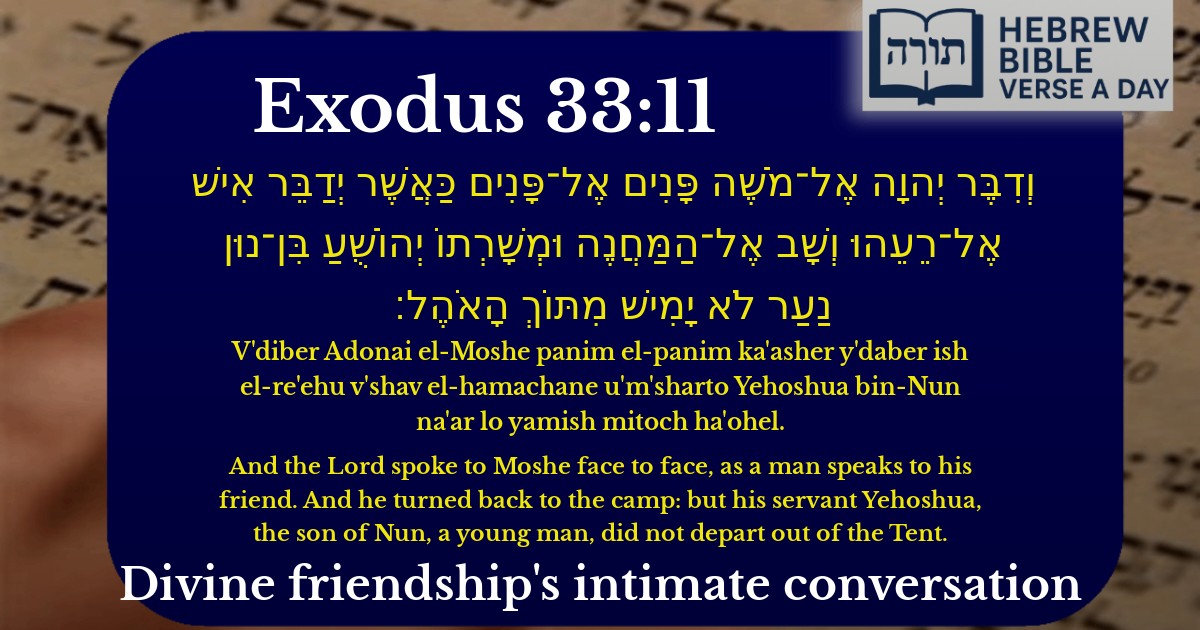Join Our Newsletter To Be Informed When New Videos Are Posted
Join the thousands of fellow Studends who rely on our videos to learn how to read the bible in Hebrew for free!
Hebrew Text
וְדִבֶּר יְהוָה אֶל־מֹשֶׁה פָּנִים אֶל־פָּנִים כַּאֲשֶׁר יְדַבֵּר אִישׁ אֶל־רֵעֵהוּ וְשָׁב אֶל־הַמַּחֲנֶה וּמְשָׁרְתוֹ יְהוֹשֻׁעַ בִּן־נוּן נַעַר לֹא יָמִישׁ מִתּוֹךְ הָאֹהֶל׃
English Translation
And the Lord spoke to Moshe face to face, as a man speaks to his friend. And he turned back to the camp: but his servant Yehoshua, the son of Nun, a young man, did not depart out of the Tent.
Transliteration
V'diber Adonai el-Moshe panim el-panim ka'asher y'daber ish el-re'ehu v'shav el-hamachane u'm'sharto Yehoshua bin-Nun na'ar lo yamish mitoch ha'ohel.
Hebrew Leining Text
וְדִבֶּ֨ר יְהֹוָ֤ה אֶל־מֹשֶׁה֙ פָּנִ֣ים אֶל־פָּנִ֔ים כַּאֲשֶׁ֛ר יְדַבֵּ֥ר אִ֖ישׁ אֶל־רֵעֵ֑הוּ וְשָׁב֙ אֶל־הַֽמַּחֲנֶ֔ה וּמְשָׁ֨רְת֜וֹ יְהוֹשֻׁ֤עַ בִּן־נוּן֙ נַ֔עַר לֹ֥א יָמִ֖ישׁ מִתּ֥וֹךְ הָאֹֽהֶל׃ {פ}
Parasha Commentary
📚 Talmud Citations
This verse is quoted in the Talmud.
📖 Yevamot 49b
The verse is cited in a discussion about the unique level of prophecy attained by Moses, emphasizing that he spoke with God 'face to face' unlike other prophets.
📖 Sotah 13b
The verse is referenced in the context of discussing Joshua's dedication and his role as Moses' attendant, highlighting his constant presence in the Tent of Meeting.


The Unique Relationship Between Hashem and Moshe
The phrase "פָּנִים אֶל־פָּנִים" (face to face) emphasizes the unparalleled prophetic level of Moshe Rabbeinu. Rashi (Shemot 33:11) explains that this denotes clarity and directness in communication, unlike other prophets who received visions through dreams or allegories. The Rambam (Yesodei HaTorah 7:6) elaborates that Moshe's prophecy was unique in that he perceived the Divine word without any intermediary or obscurity, akin to a conversation between friends.
Moshe's Return to the Camp
The verse states "וְשָׁב אֶל־הַמַּחֲנֶה" (and he returned to the camp), indicating that after receiving prophecy, Moshe resumed his leadership duties. The Sforno notes that this demonstrates Moshe's humility—despite his exalted spiritual state, he did not isolate himself permanently but returned to guide Bnei Yisrael.
Yehoshua's Devotion in the Ohel Moed
The description of Yehoshua as "נַעַר לֹא יָמִישׁ מִתּוֹךְ הָאֹהֶל" (a young man who did not depart from the Tent) is interpreted by Rashi as a sign of his exceptional dedication. The Midrash Tanchuma (Bamidbar 12) explains that Yehoshua would remain in the Ohel Moed to absorb Torah wisdom, preparing for his future role as Moshe's successor. The term "נַעַר" (young man) may also allude to his humility and willingness to serve, as noted by the Malbim.
Contrast Between Moshe and Yehoshua
Lessons in Leadership and Torah Study
The juxtaposition of these two figures teaches that while Moshe achieved the highest level of prophecy, Yehoshua's commitment to Torah study in the Ohel Moed laid the foundation for his future leadership. The Kli Yakar highlights that true leadership requires both divine connection (like Moshe) and unwavering dedication to Torah (like Yehoshua).